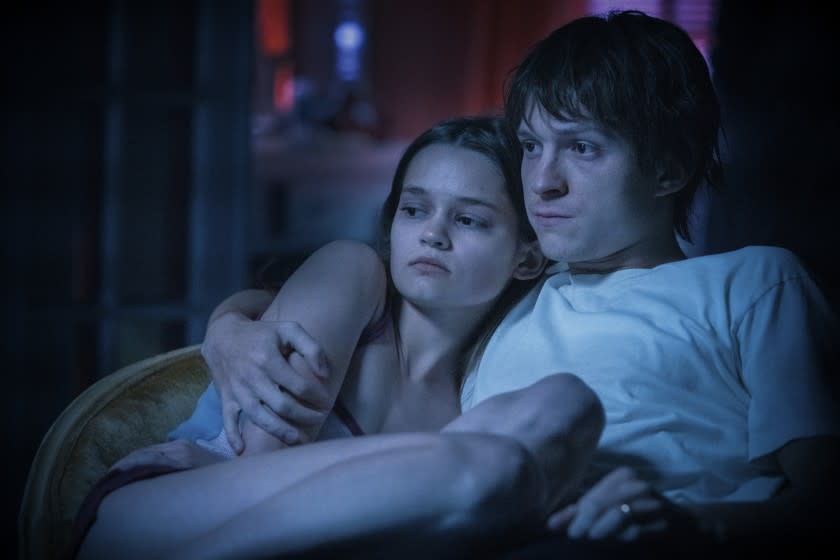Review: Overamped 'Cherry' takes on plight of PTSD-afflicted war veteran

The Times is committed to reviewing theatrical film releases during the COVID-19 pandemic. Because moviegoing carries risks during this time, we remind readers to follow health and safety guidelines as outlined by the Centers for Disease Control and Prevention and local health officials.
Before the fraternal directing team of Anthony and Joe Russo became the go-to duo for Marvel blockbusters — helming two “Captain America” and two “Avengers” movies — they were known primarily for their comedies. They worked in TV on the likes of “Arrested Development” and “Community;” and their raucous early films “Welcome to Collinwood” and “You, Me and Dupree” hardly suggested that one day they’d direct four of the highest-grossing superhero pictures of all time.
The Russos have now attempted another expectation-defying genre-switch with “Cherry,” a heavy drama about an opioid-addicted bank robber. Based on Nico Walker’s semi-autobiographical novel (adapted by screenwriters Angela Russo-Otstot and Jessica Goldberg), the film stars Tom Holland as the title character: a rootless, directionless kid from Ohio, who gets so rattled by a stint in the military that he starts popping pills to settle his nerves. Eventually, he drags his wife Emily (Ciara Bravo) into his world of desperation and squalor.
This would be tough material for anyone to tackle, and the Russos take aesthetic chances that — while admirably bold — flop more often than they fly. “Cherry” is aggressively expressionistic, aiming to explicate how the protagonist went from being an unexceptional college student to the junkie scourge of the Ohio banking industry. The Russos layer in visual effects, pepper the narrative with surreal interludes, move the camera dynamically and maintain an overall look dominated by dim lighting — aside from certain people and objects that have a sickly, irradiated glow.
This approach works best in the Army scenes, where Cherry goes through basic training, becomes a medic and ultimately ends up in the thick of battles, treating horrific wounds. There’s a “Full Metal Jacket” quality to this stretch of the film, which satirizes the over-cranked meat grinder of military life — while also showing the bloody sausage that results.
But the amped-up style becomes punishing in the second half, as the PTSD-affected Cherry slides quickly into a life of crime and dope. The Russos and their creative team try to maintain the wryness and weirdness of their wartime sequences by having the hero describe hold-ups and drug-acquiring in matter-of-fact terms — sounding like a guy at a bar griping about the daily grind — as he beefs about uncooperative bank tellers who won’t just hand over their money. The darkly comic tone can’t mitigate the movie’s unrelenting misery though, as it slogs along for 141 exhausting minutes.
There are ways to make this kind of movie at once artful, entertaining and true. “Drugstore Cowboy,” “Jesus’ Son” and “Fear and Loathing in Las Vegas” — among others — capture the unique wonders and profound pain of an addict’s life, all while commenting on the incurable illnesses within American culture. But in those films, the characters are charmingly eccentric and offhandedly poetic in ways the irritable and off-putting “Cherry” characters just aren’t.
The Russos have a strong cast. Holland adroitly funnels his vulnerability — the core of his screen presence — into someone who uses his weaknesses to justify terrible behavior. Bravo is a revelation as a smart young woman who starts using drugs in part to understand her rapidly disappearing husband, before she veers off onto her own rocky road. The character actors Jack Reynor, Michael Rispoli, Michael Gandolfini, Thomas Lennon and Damon Wayans Jr. all have memorable moments. But none of these people are ever good company. It’s a chore to spend more than two hours with them.
“Cherry” is far from a disaster. If nothing else, the creators smartly position their source material’s personal narrative as a modern everyman story, with an arc familiar to too many 21st century Americans. The lack of career opportunities, the traumatic experiences, the allure of oblivion …. These are like Stations of the Cross for a lot of people who end up hooked on opioids.
But this particular story needed a defter touch. When the Russos moved from absurdist sitcoms to "The Avengers," they brought a fresh new energy to the superhero genre by emphasizing the little grace notes within the actors’ performances. With “Cherry” they do the opposite, applying the bombast of a Marvel action sequence to a slice-of-life drama. It’s a miscalculation — like using Thor’s hammer to build a bookshelf.
This story originally appeared in Los Angeles Times.